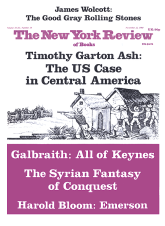In response to:
Making It New from the June 14, 1984 issue
To the Editors:
Helen Vendler’s reviews are specially interesting because she attempts to place the work under review within the continuity of English poetic idioms. The case of John Ashbery’s writing is an unusually complex one. While reading “Ditto, Kiddo” [NYR, June 14] I was struck by a reminiscence of a Wallace Stevens poem at the sudden transition of lines 23–25.
Compare
Each day seems full of itself, and yet it is only
A few colored beans and some stray lying on a dirt floor
In a mote-filled shaft of light….
with
The day is great and strong—
But his father was strong, that lies now
In the poverty of dirt.
(“World Without Peculiarity” 1–3)
I am not here interested in the question of whether Ashbery was more or less consciously alluding to the lines of Stevens. Stevens’s opening is calculated to lead into a large-scale exploitation of the Oedipal theme in its epistemological implications: the individual’s relation to the phenomena. Ashbery’s procedures are always fragmentary, abstracting, and more on the side of solipsism.
Vendler’s criticism is valuable because it reaches back. From the historian’s point of view—my view—the linguistic habits of poets when they work into similar areas of myth and imagery constitute a public order with a significance apart from that we take in the relation of one poet to another on a more personal level.
Richard Harrier
New York University
New York City
This Issue
November 22, 1984



